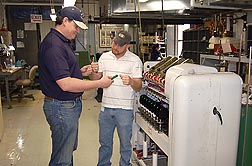Washington, DC, USA
October 27, 2014

In the textile mill at the Southern Regional Research Center, materials engineer Chris Delhom (left) and technician E.J. Deshotel examine yarn packages in front of the miniature spinning equipment. Photo by Melissa Dunn.
The U.S. Department of Agriculture (USDA) pilot plant for studying cotton textiles located at the Southern Regional Research Center (SRRC) in New Orleans, Louisiana, has been upgraded. Materials engineer Christopher Delhom has successfully “reimagined” some of the pilot plant’s cotton processing equipment. He outfitted model cotton-spinning equipment to be able to spin as little as 30-60 grams (1-2 ounces) of cotton fibers grown from selected experimental seeds. The equipment is capable of taking a very small fiber sample grown from test seeds and processing those fibers all the way through the milling process into yarn and fabrics.
The SRRC is part of the Agricultural Research Service (ARS)—the chief intramural scientific research agency of USDA.
The tiny batch of fibers can be quickly tested to gauge the new varieties’ fiber performance and viability for use on standard equipment and in textiles. Delhom and James Rodgers, who heads the ARS Cotton Structure and Quality Research Unit at SRRC, note that the pilot plant’s new miniature processing equipment accomplishes in 2 weeks what would take months to test on a full-scale industrial fleet of textile machinery. In the past, this kind of testing took place at a pace of less than 200 samples per year, using samples weighing from 25 to 150 pounds each.
Cotton grows and performs differently based on region and seed genetics. Large-scale processing equipment is customized to accommodate regional features. But, a small change in seed breed can greatly affect cotton fiber quality during processing and through to finished fabric. Getting timely information about the processing performance of new cotton varieties is key.
The pilot plant’s miniature-spinning equipment is being used to process fiber samples in the National Cotton Variety Trials, which is an ARS-led national trial of varieties involving U.S. breeders. Read more about the cotton textile pilot plant upgrades in the October 2014 issue of Agricultural Research magazine.